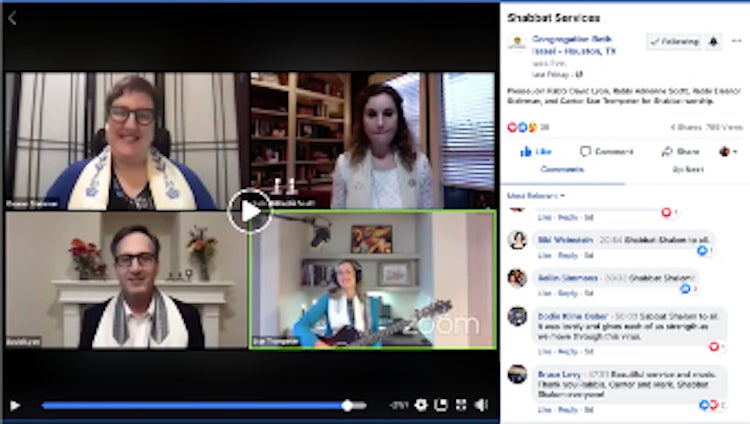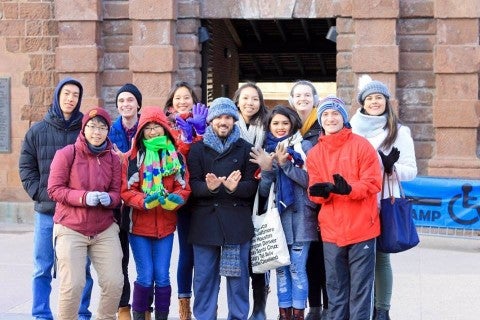Despite moving to a remote format, the Houston Jewish History Archive is as busy as ever with two new projects that are documenting the experiences of Jewish Houstonians amid the COVID-19 pandemic.
Since its founding in 2017, the archive’s work has focused on processing collections in the Woodson Research Center and physically going out into Houston communities to meet residents and gather new archival materials. Since these operations have been put on indefinite hold due to the coronavirus, the HJHA has found ways to redirect its efforts by collecting materials related to Jewish life and worship during this unprecedented time.
“We're in a very challenging historical moment in which it feels like changes that we normally think of as happening over years and decades are literally taking place day to day,” says Joshua Furman, archive founder and curator. “When it's your mission and your job to document the history of the Houston Jewish community, it just seemed like a natural fit for the archive to shift focus to documenting the present moment, and looking at how organizations here in the community are responding to the crisis in real time.”
After reaching out to community members via social media and local press, Furman and his team have collected essays, Zoom screenshots, Facebook posts and more that reveal how Jewish communities have adapted to the pandemic. Nationwide lockdowns went into effect just a few weeks before Passover, an important holiday in the Jewish faith that centers around family gatherings and a seder, or ritual feast. With travel restrictions and safety concerns to grapple with, Jewish families met over Zoom to celebrate the holiday. Screenshots and videos of traditional Jewish ceremonies carried out online well as digital materials collected from restaurants and schools are among the materials collected from Houston’s community by HJHA.
Another development for Jewish life under quarantine is the emergence of virtual synagogue services. Furman explains that because Judaism is a very communal faith, congregations have had to adapt their services, prayer traditions and community programming drastically. He shared one screenshot from a Friday night Shabbat service held over Zoom by Congregation Beth Israel, the oldest Jewish house of worship in Texas.
Whereas, in normal circumstances, clergy and congregants would be gathered together under one roof, here each of the rabbis and the cantor led the services from their separate homes, while congregants followed along on their laptops, tablets, and phones.
“This image really encapsulates how Judaism in Houston has adapted to life under lockdown and on Zoom,” Furman says. “On the one hand, this image is very poignant because obviously, the person who's doing the praying at home is not having that direct communal experience. And yet by being able to hear the familiar music that the cantor is playing, there's still a sense of connection and a sense of community being forged.”
The HJHA sprouted from an idea posed by Furman and Matthias Henze, director of Rice’s Program in Jewish Studies, to collect oral histories of Jewish life in Texas. The destruction caused by Hurricane Harvey in 2017 motivated the archive to concentrate its attention to document recovery, but now, the archive is reviving its oral history work with another new project begun under lockdown. By utilizing video chat technology like Zoom, HJHA is interviewing members of the local Jewish community to document how the pandemic has impacted their lives and careers.
One community member interviewed by the archive is Joe Buchanan, a country music artist based in Clear Lake. Like many musicians, he has had to adjust to a world where opportunities to travel the country for live performances or participate in artist residency programs are slim. However, there are bright sides — Joe has been able to spend more time in his home studio, releasing music and remotely performing for congregations and community institutions via Facebook Live.
The archive’s repository of COVID related materials will likely be available online by the Fall 2020 semester. Like the pandemic itself, the nature and timeline of the projects will continue to fluctuate, adapting to the experiences and needs of Houston’s Jewish community in order to capture this historic moment as comprehensively as possible.
Documenting local Jewish community lives amid COVID-19
Houston Jewish History Archive capturing experiences of Houstonians as crisis unfolds


